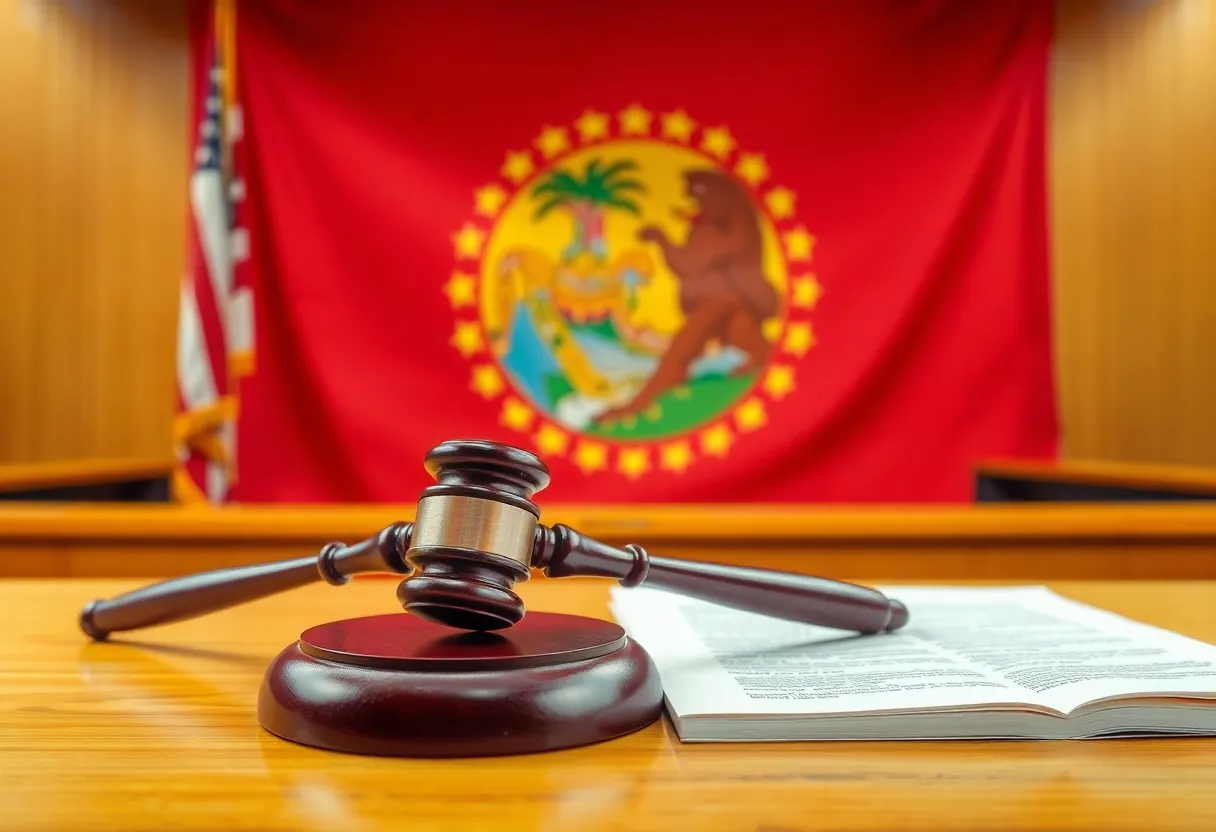

A courtroom where critical decisions on immigration law are being made, reflecting tensions in Florida.
A federal judge has temporarily halted the enforcement of Florida’s new immigration law that criminalizes entry for undocumented individuals. The ruling highlights the ongoing tensions between state officials and the judiciary as the law faces scrutiny for its potential unconstitutionality. Florida’s Attorney General has indicated he will continue to push for enforcement, raising concerns about respect for judicial decisions and the implications for undocumented individuals.
A federal judge has temporarily blocked the enforcement of a new immigration law in Florida, a move that underscores the ongoing legal battles surrounding immigration policies in the state. The law in question makes it a crime for undocumented individuals to enter Florida, eliciting swift backlash from civil rights advocates, particularly the American Civil Liberties Union (ACLU), which filed a challenge against it.
U.S. District Judge Kathleen Williams issued the temporary restraining order, suggesting that the law is likely to be found unconstitutional, particularly as it raises serious concerns regarding its impact on the rights of undocumented individuals. The ruling explicitly stipulates that local and state law enforcement officials are prohibited from using the law to arrest individuals pending further legal review.
Florida’s Attorney General, James Uthmeier, appointed by Governor Ron DeSantis earlier this year, appears to be at the center of the controversy. Following Judge Williams’ ruling, Uthmeier released a memo indicating that he believed there was no legal barrier preventing the enforcement of the law. His communications have raised eyebrows and concern among legal professionals who fear he is encouraging law enforcement to ignore the judge’s order.
Judge Williams expressed skepticism regarding Uthmeier’s motives, branding herself a “very linear thinker,” a remark that highlights the tension between the judiciary and the state’s executive branch. Uthmeier’s attorney, Jesse Panuccio, has defended his actions by claiming that Uthmeier was only clarifying the legal stance on the issue and had previously instructed law enforcement to adhere to the court’s order.
Moreover, Uthmeier’s public remarks in media interviews have drawn scrutiny, particularly as he previously stated his reluctance to simply “rubber stamp” the judge’s order. This has led to questions about his respect for the judicial process and compliance with legal rulings. His challenges to the ruling have escalated tensions between state and federal enforcement, with Uthmeier subsequently appealing Judge Williams’ decision to the 11th Circuit Court of Appeals.
Should Uthmeier be found in contempt of court, he could face serious consequences, including potential fines or even jail time. Yet, he maintains that the law he aims to enforce aligns with federal immigration regulations and asserts that he has not violated any court orders thus far.
Immigrant rights groups have vehemently criticized Uthmeier’s interpretation of the law, arguing that his actions could be viewed as contempt of court since they may encourage unlawful arrests, despite the judge’s explicit order halting the law’s enforcement. Reports indicate that, since Uthmeier’s April 18 communication to law enforcement, no arrests have been made under the contested portion of the law.
The unfolding drama stems from conflicting directives issued by Uthmeier, leading to a precarious situation for both enforcement and undocumented individuals. Uthmeier, who previously served as DeSantis’ chief of staff, is also eyeing re-election in 2026, adding a political dimension to the legal fracas.
In light of the ongoing legal battle, Judge Williams has stressed the importance of adherence to court orders, warning against the descent into anarchy should state officials choose to dismiss judicial decisions. While Uthmeier argues that state sovereignty allows Florida to enact its immigration policies, the clash with the judicial system raises fundamental questions about the balance of power and the rule of law.
As this case continues to unfold, Florida’s legal landscape regarding immigration enforcement is poised for potentially significant shifts, with the life of many undocumented individuals hanging in the balance. The implications of this legal tussle could reverberate far beyond the borders of the Sunshine State, making it a critical watchpoint for immigration policy across the nation.
The Vital Role of Car Accident Lawyers in Legal Cases
BANA LAW, PC: A New Name for an Established Lawyer Firm
Jeanine Pirro Appointed as U.S. Attorney: A New Chapter
Lawyer Sparks Controversy Over Florida’s New Immigration Law
Las Vegas Car Accident Lawyers Expand Personal Injury Services
Gulotta & Gulotta: Leading Personal Injury Lawyers in Long Island
Local Lawyers Stress Importance of Timely Personal Injury Claims
Legal Showdown: Lawyers Azar & Associates Sue Bachus & Schanker
Anchorage Lawyer Faces Severe Federal Charges in Drug Case
Russell Nicolet: A Lawyer Transforming Personal Injury Law
News Summary The Illinois Trial Lawyers Association will honor the late Randy L. Gori with…
News Summary The South Carolina Small Business Chamber of Commerce is urging President Trump to…
News Summary South Carolina has surpassed Texas as the fastest-growing state in 2024, driven by…
News Summary Atlantic Coast Electric Supply (ACES) has been named one of South Carolina's Top…
News Summary A&W Restaurants is actively seeking franchise partners in Columbia, South Carolina, to expand…
News Summary The Spoleto Festival USA has commenced in Charleston, showcasing over 120 performances across…